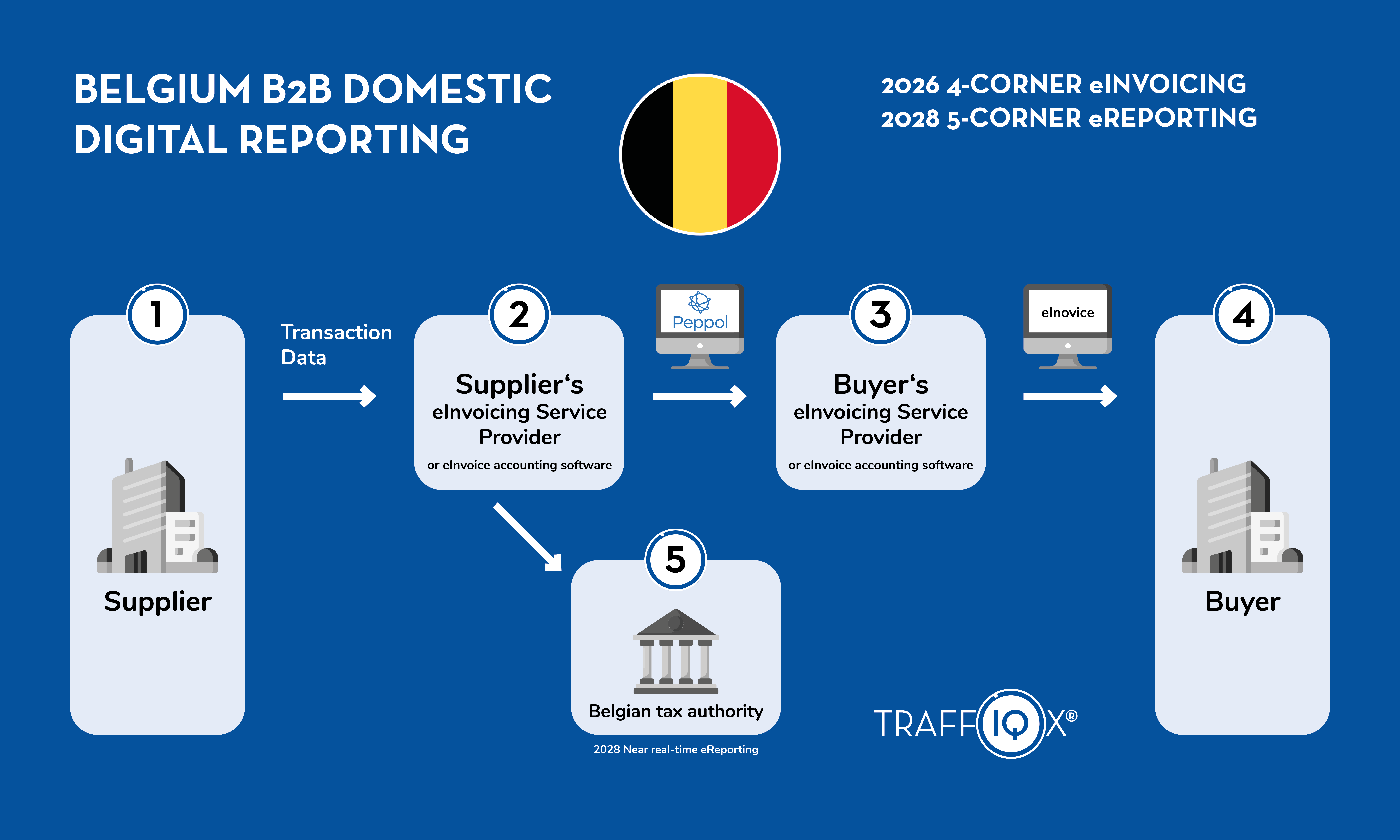Belgium goes for Peppol:
New rules for electronic invoicing from 2026
New rules for electronic invoicing from 2026
The digitization of business processes continues to advance in Europe—and Belgium is playing a leading role. With a recent royal decree, the country has now created a clear framework for the mandatory use of structured electronic invoices in the B2B sector. This decision not only affects Belgian companies, but also has significant implications for anyone who does business with partners in Belgium.
Mandatory electronic invoicing in Belgium from January 2026
The Belgian government has once again expressly confirmed the introduction of electronic invoicing for all B2B transactions from January 1, 2026, by means of a Royal Decree. This means that from this date, it will no longer be permitted to use traditional paper invoices or simple PDFs in Belgium. Instead, all invoices between companies must be created and transmitted as structured e-invoices. The regulation applies exclusively to companies based in Belgium, but not to foreign companies that merely have business relations with Belgium.
Peppol as the technical standard for Belgium in the B2B sector
A key element of the new decree is the establishment of Peppol as the mandatory standard for electronic invoicing in Belgium. Peppol—a Europe-wide network for the secure exchange of business documents—will become mandatory in Belgium from 2026 for the transmission of e-invoices. The most important details are as follows:
- Standardization: In Belgium, all structured e-invoices must comply with the European standard EN 16931 in order to enable smooth and automated processing.
- Mandatory format: The Peppol BIS format (UBL version) is defined as the default format for e-invoices in Belgium and is therefore the technical benchmark.
- Transmission channel: The Peppol network is the standard transmission channel for invoices in Belgium.
- Alternative formats: Other formats are only permitted if both the invoice issuer and recipient in Belgium agree and the format in question fully complies with the EN 16931 standard.
Even if companies in Belgium wish to use alternative methods, the technical capability to process Peppol BIS invoices remains mandatory. This is to ensure that the Belgian system remains interoperable at all times and that no isolated solutions arise.
New rules for VAT rounding on Belgian eInvoices
Another important point in the Belgian decree concerns the way in which VAT is calculated and rounded on structured eInvoices. From 2026, it will only be permissible in Belgium to round VAT at the end, i.e. on the total amount of the invoice. Rounding at item level will be prohibited in Belgium in the future. This change will create greater transparency, particularly in the automated processing of invoices, and prevent potential sources of error that could previously arise due to differing rounding rules.
Belgium focuses on deterrence: significant penalties for violations
The Belgian decree provides for severe penalties for non-compliance with the new eInvoicing rules. Companies that ignore or fail to correctly implement the mandatory use of structured eInvoices in Belgium risk graduated fines:
- First violation: €1,500
- Second violation: €3,000
- Each additional violation: €5,000
There is a three-month period between individual violations, meaning that repeat offenders in Belgium can quickly face very high fines. These strict sanctions show how serious Belgium is about digitization and compliance with the new eInvoicing standards.
Belgium sets the course for the future: Focus on real-time reporting
In addition to the obligation to use structured eInvoices with Peppol, Belgium is also preparing for upcoming developments. The Peppol network is explicitly named as the backbone for future solutions in the area of near real-time VAT reporting. This puts Belgium in a position to implement the requirements of the upcoming EU ViDA Directive quickly and effectively. Companies that establish Peppol-compliant systems in Belgium now will therefore be optimally prepared not only for the eInvoicing obligation from 2026, but also for more extensive reporting obligations.
Take action now to remain compliant with electronic invoicing in Belgium
The new Royal Decree finally clarifies how electronic invoicing will work in Belgium from 2026 onwards. However, the eInvoicing obligation (so far) only applies to companies based in Belgium and foreign companies that are registered for VAT in Belgium and generate taxable B2B sales there. Purely foreign transactions without Belgian VAT registration are exempt from the new obligation. Anyone doing business in Belgium or working with Belgian companies should therefore start the transition to the Peppol system now and check the new rounding rules and technical requirements in-house. The severe penalties underscore that Belgium is pursuing this issue vigorously and will not tolerate any exceptions.
Tip: PwC Belgium has announced that it will publish a more in-depth analysis of the impact of the decree shortly. It is therefore worth keeping an eye on developments relating to eInvoicing and digitization in Belgium.
Implement electronic invoice exchange with Belgium easily – with TRAFFIQX®
From 2026, the use of structured electronic invoices will be mandatory in Belgium for domestic B2B transactions. The introduction of the Peppol standard as a legally prescribed transmission channel places clear technical requirements on Belgian companies. With TRAFFIQX®, invoices can be sent and received quickly, securely, and in compliance with standards in Peppol BIS format. The solution supports compliance with the EN 16931 standard and optimally prepares companies for future developments such as real-time reporting. This ensures that intra-Belgian business processes remain smooth, secure, and future-proof – without any compliance risks.
Want to learn more? Schedule a free consultation with our expert Lars Becher, Key Account Manager and Subject Matter Expert for eInvoicing and CTC in the TRAFFIQX® network.
Call him at: +49 (0)6359 - 9 37 90




